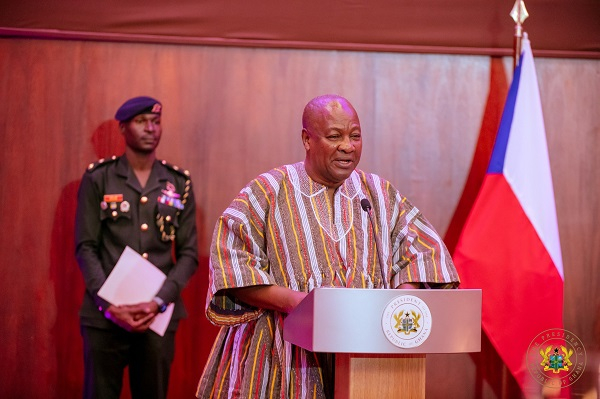President John Dramani Mahama has officially launched the ambitious Feed Ghana Programme, his administration’s flagship agricultural policy. The programme aims to secure Ghana’s food future, create jobs, and boost agro-industrial development.
Speaking at the launch event at Techiman in the Bono East Region, he described Ghana’s agricultural sector as being at a critical crossroads, urging a bold reset to transform it from a subsistence activity into the backbone of the country’s economic revival.
A Call to Action for Agricultural Transformation
President Mahama lamented the persistent challenges that continue to undermine Ghana’s agricultural progress, including low productivity, poor infrastructure, and weak value chains. Despite previous efforts, the country still imports over $2 billion worth of food annually. He emphasized the need to view agriculture as the engine of economic transformation and not merely a development issue.
Feed Ghana under the Agriculture for Economic Transformation Agenda (AETA)
The Feed Ghana Programme is being implemented as the central initiative under the broader Agriculture for Economic Transformation Agenda (AETA). President Mahama described it as a comprehensive and strategic umbrella under which all agricultural interventions will be housed, designed to boost production, modernize farming, reduce food inflation, and support agro-industry.
Focus Areas and Priority Commodities
The programme will prioritize key commodities critical to food security, import substitution, and industrial development.
These include:
Grains & Legumes: Maize, Rice, Soybean, Sorghum
Vegetables: Tomato, Onion, Pepper
Starchy Crops: Cassava, Plantain, Yam
Industrial Crops: Cocoa, Mango, Oil Palm, Cotton, Cashew, etc.
Livestock: Poultry, Cattle, Sheep, Goats, and Pigs
Key Interventions for Agricultural Reset
President Mahama outlined nine key interventions to be rolled out under the Feed Ghana Programme:
Promotion of SMART Agriculture: Establishment of Farmer Service Centres and development of land banks to support young agripreneurs.
Grains and Legumes Development: Scaling up production for local use and exports, especially sorghum for brewery.
Vegetable Development (YƐREDUA): Emphasis on greenhouse and urban farming to reduce dependence on imports from neighboring countries.
Institutional Farming: Encouraging households, schools, and institutions to cultivate food crops to reduce the cost of living and instill agricultural values.
Poultry Industry Revamp (Nkoko Nketenkete): Support for poultry farmers to cut down $300M chicken imports and introduce backyard poultry farming.
Livestock Development: Promotion of cattle, pig, and small ruminant farming with improved breeds and veterinary support.
Tree Crop Development – Feed the Industry: Focus on oil palm (brown gold) with national policy to close domestic supply gaps and target global markets.
Agro-Production Enclaves: Creation of zones with irrigation, warehousing, and roads to attract private investment.
Innovative Agricultural Financing: Reform of EXIM Bank, expanded use of GIRSAL, and risk-sharing mechanisms to support farmers and agri-enterprises.
Youth, Research, and Institutional Participation
The programme seeks to close the gap between agricultural research and practice.
A partnership between the Ministry of Agriculture and National Service Scheme will deploy 5,000 graduates in agriculture and veterinary science to support implementation.
Several key institutions—including faith-based organizations, universities, and state agencies—have already pledged support.
A United Call to Feed Ghana
President Mahama made a passionate call for collective effort. He called on all stakeholders—farmers, private sector players, financial institutions, and the general public- to rally behind the programme.
He emphasized that the success of Feed Ghana depends on the unity of purpose and bold commitment from every sector.
“Let us put our shoulders to the wheel… With unity and hard work, we can transform Ghana’s agriculture to ensure food and prosperity for all.”
With those words, the Feed Ghana Programme was officially declared launched.
Watch the latest edition of BizTech below:
Click here to follow the GhanaWeb Business WhatsApp channel
